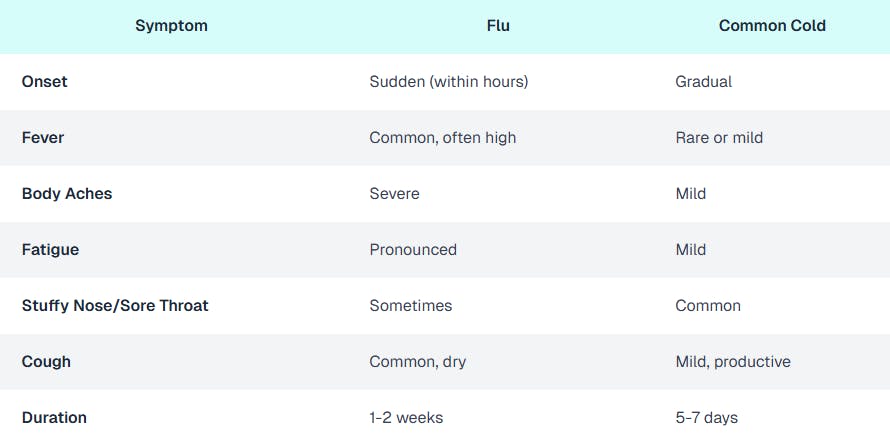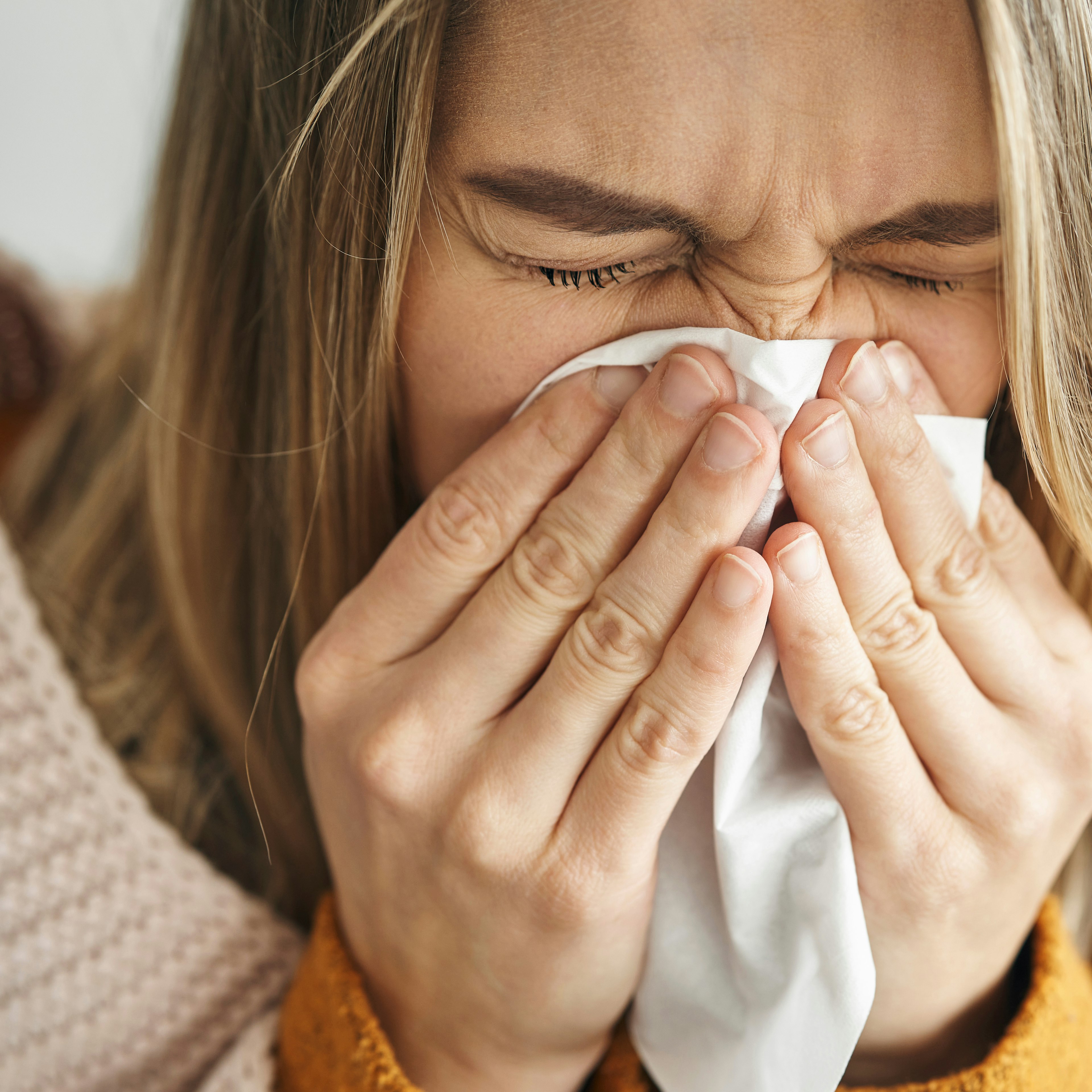The flu is a respiratory illness caused by influenza viruses that can leave you feeling weak, achy, and exhausted. Because flu symptoms can look a lot like a common cold, it’s often hard to know when to take medication, when home remedies may help, and when to see your doctor.
This guide explains which flu medicines and natural remedies actually help, which supplements can support your recovery, and how to tell the difference between the flu and a cold so you know what to expect and when to get tested.
Is There Medicine for the Flu?
Yes. Prescription antiviral medications are the main treatment for the flu. These medicines work by limiting the virus’s ability to multiply in your body, which can shorten recovery time and make symptoms milder—especially if started within the first 48 hours after illness begins.
It’s important to note that antivirals are different from over-the-counter (OTC) symptom relievers. While antivirals target the virus itself, OTC medications only ease discomfort from fever, congestion, or body aches.
What Is the Best Medicine for the Flu?
Doctors may prescribe antiviral medications such as:
- Tamiflu (oseltamivir) – the most commonly prescribed antiviral, taken as pills or liquid
- Relenza (zanamivir) – inhaled medication for certain patients
- Xofluza (baloxavir) – a newer single-dose option
These medications work best when started within the first 48 hours of symptoms. They don’t cure the flu instantly, but they can help you feel better faster and reduce the risk of complications.
Over-the-counter medications can also help manage symptoms:
- Acetaminophen or ibuprofen – reduce fever and body aches
- Decongestants – relieve nasal congestion
- Cough suppressants – calm persistent coughing so you can rest
Always talk with your healthcare provider before taking a new medication, especially if you’re pregnant, caring for a child, or managing chronic conditions like asthma, heart disease, or diabetes.
What Supplements Help With the Flu?
Supplements don’t cure the flu, but some may help support your immune system and shorten symptom duration:
- Vitamin C – supports immune cell function and may slightly reduce how long symptoms last
- Zinc – may help shorten recovery time when taken early
- Vitamin D – supports immune defense, especially if you’re deficient
- Elderberry, echinacea, and probiotics – popular natural options, though research is mixed and results vary
Think of supplements as supportive, not curative. They should complement, not replace, medical care. If you take prescription medicines or have ongoing conditions, check with your doctor before starting any supplement.
Flu vs. Common Cold Symptoms: How to Tell the Difference
Because colds and the flu share similar symptoms, here’s a quick comparison:

The flu tends to hit harder and faster than a cold and can lead to serious complications—especially for older adults, children, and people with chronic illnesses. A cold usually improves on its own with rest and fluids.
“Feed a Flu and Starve a Cold” – Myth or Fact?
This old saying isn’t medically accurate. Whether you have the flu or a cold, hydration and balanced nutrition are essential for recovery.
When you’re sick, focus on:
- Drinking plenty of water, herbal tea, or clear broths
- Eating small, nutritious meals with fruits, vegetables, and lean proteins
- Avoiding alcohol and excess caffeine, which can dehydrate your body
Staying hydrated helps your body regulate temperature and flush out toxins—no matter which illness you have.
Natural Remedies for the Common Cold (and How They Help the Flu Too)
Natural remedies may not cure a viral infection, but they can provide relief and help your body recover:
- Rest and hydration give your immune system energy to fight infection
- Warm fluids like tea, broth, or honey in hot water soothe sore throats and loosen congestion
- Saline rinses clear nasal passages and reduce irritation
- Humidifiers or steam keep the airways moist and relieve dryness
Note: Honey should not be given to children under 1 year old due to the risk of botulism.
These remedies ease symptoms of both the flu and colds, but if you experience worsening symptoms or shortness of breath, seek medical care promptly.
When to See a Doctor for Flu Symptoms
Most people recover from the flu in about one to two weeks. However, contact a doctor right away if you experience:
- High fever lasting more than three days
- Chest pain or pressure
- Difficulty breathing or wheezing
- Severe or worsening fatigue
- Sudden confusion or dizziness
If symptoms return after improving, it could signal a secondary infection like pneumonia—get checked promptly.
High-risk patients (young children, seniors, pregnant women, and people with chronic health conditions) should see a provider early. For these groups, antiviral treatment can help prevent serious complications.
Get Relief Sooner: Flu Testing and Treatment at CLS Health
The flu can be tough, but you don’t have to face it alone. CLS Health family medicine providers offer same-day flu testing, antiviral prescriptions, and supportive treatment to help you recover quickly.
One of the best ways to stay protected is by getting your annual flu shot. If you’re unsure whether your symptoms are from the flu or a cold—or your symptoms are getting worse—don’t wait.
Schedule an appointment today to get tested, treated, and back to feeling your best.
FAQs
No. Antibiotics treat bacterial infections, not viruses like the flu. Taking them unnecessarily increases the risk of antibiotic resistance without helping you recover.
Without treatment, flu symptoms usually last 5–7 days, with fatigue sometimes lasting up to two weeks. Antivirals started early can reduce symptom length and severity by about one to two days.
Water is essential to prevent dehydration. Herbal teas, broths, and electrolyte drinks can also soothe your throat and replenish fluids.
Yes. The flu vaccine is the most effective way to prevent severe illness or complications. Even if you do catch the flu, the vaccine usually makes symptoms milder and recovery faster.
It’s uncommon but possible. Your provider can perform a quick flu test to confirm the cause and recommend the right treatment.





